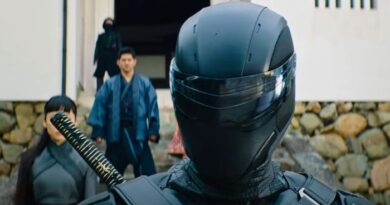Thunderbolts* Brings Soul Back to the MCU
It’s been a while since a Marvel movie made me lean in and care—really care—about its characters. But Thunderbolts does exactly that. Equal parts thrilling, thoughtful, and refreshingly grounded, this latest chapter in the MCU reminds us that superhero stories don’t always have to save the world—they just have to mean something to the people in them.
Directed by Jake Schreier (Beef), Thunderbolts doesn’t just throw together another team of mismatched heroes. It slows down. It gives space to breathe, to connect, and to genuinely invest in who these characters are beneath the suits and scars.
The film brings together a cast of former sidekicks, screwups, and survivors: Yelena Belova (Florence Pugh), John Walker (Wyatt Russell), Ghost (Hannah John-Kamen), Taskmaster (Olga Kurylenko), Red Guardian (David Harbour), and Winter Soldier (Sebastian Stan), all manipulated by CIA director Valentina de Fontaine (Julia Louis-Dreyfus). Add in newcomer Bob (Lewis Pullman), and you’ve got a ragtag crew of broken souls trying to survive—and maybe do something good along the way.
At the heart of it all is Florence Pugh’s Yelena, and she’s phenomenal. This isn’t just another action role. Pugh brings depth, vulnerability, and razor-sharp wit, making every scene she’s in hit that much harder. Her chemistry with Harbour’s Red Guardian remains strong, and Pullman’s Bob adds a mysterious emotional layer to the group dynamic.
The real strength of Thunderbolts lies in its character work. There’s no multiversal threat or cosmic catastrophe. The stakes are personal. These aren’t gods or geniuses—they’re flawed individuals burdened by trauma, guilt, and a shared history of being used and discarded. That emotional weight makes their connections feel authentic and earned.
Yes, the film delivers on action—from balletic hallway fights to moody, tightly choreographed sequences that evoke Oldboy and The Bourne Identity. But what stands out is how those moments serve the story, not the other way around.
What resonated most with me? The film’s willingness to explore the emotional toll of covert programs and buried trauma. It’s messy. It’s sometimes bleak. But there’s a quiet hope running through it all—a belief that broken people can still choose to do better. The themes of mental health, shame, and redemption are handled with a sincerity that’s rare in this genre.
This movie doesn’t rely on flying gods or CGI chaos to wow you. It works because it stays grounded in human emotion. And while the final act leans a bit into abstract territory, it never loses its emotional thread.
For me, Thunderbolts easily ranks among the top four Marvel films post-Endgame. It’s clever, bold, and emotionally resonant. More importantly, it made me feel something again in a Marvel movie—and that’s no small feat.
After years of chasing spectacle, Thunderbolts proves Marvel still knows how to tell stories with soul.
Final Verdict: 4 stars (out of 5)




